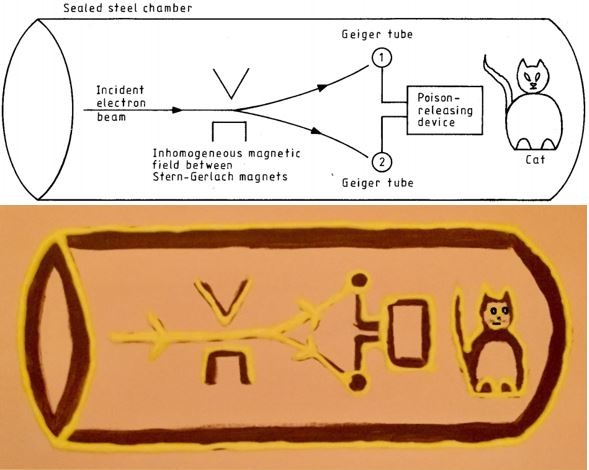
Designing Science Learning Domains for 2e (Twice Exceptional) Students
Abstract
2e (twice-exceptional) students are gifted and differently-abled, so they need specific learning domains according to their needs. This research aimed to design science learning domains for a 2e (gifted and blind) student to enhance his critical thinking in his special learning needs in Ankara province in Turkey in the 2020-2021 academic year's first term. Single-subject research was employed. The 2e student was ten years old. Through the application process, the 2e student argued 3D modeled Schrödinger's cat thought experiment. The main application's intervention was conducted to provide the research's internal validity since it was single-subject research. Through the intervention application, the 2e student argued 3D modeled Schrödinger's twin cats thought experiment. We noted both social dialectic argumentation processes as texts, and these texts were used as data collecting tools. Descriptive analysis was utilized to gathered data. The study showed that the 2e student could construct arguments containing claim, data, warrant, and weak rebuttals in the main application, which meant his argumentation quality level was average, so his critical thinking too. In contrast, the 2e student-constructed arguments containing claim, data, weak rebuttal, and rebuttal meant his argumentation quality level enhanced his critical thinking.
Full Text:
DOWNLOAD PDFReferences
Assouline, S. G., Foley-Nicpon, M., & Huber, D. H. (2006). The impact of vulnerabilities and strengths on the academic experiences of twice-exceptional students: A message to school counsellors. Professional School Counselling, 10(1), 14-24.
Baldwin, L., Omdal, S. N., & Pereles, D. (2015). Beyond stereotypes: Understanding, recognizing and working with twice-exceptional learners. Teaching Exceptional Children, 47(4), 216-225.
Barber, C., & Mueller, C. T. (2011). Social and self-perceptions of adolescents identified as gifted, learning disabled and twice-exceptional. Roeper Review, 33, 109-120.
Beckley, D. (1998). Gifted and learning disabled: Twice-exceptional students. National Research Center on Gifted and Talented, 2-7.
Besnoy, K. D., Swoszowski, N. C., Newman, J. L., Floyd, A., Jones, P., & Byrne, C. (2015). The advocacy experiences of parents of elementary age, twice-exceptional children. Gifted Child Quarterly, 59(2), 108-123.
Cambridge International AS & A Level Thinking Skills 9694, Syllabus (2020-2022), https://www.cambridgeinternational.org/Images/415052-2020-2022-syllabus.pdf.
Cooper, R. (2005). Thought experiments. Metaphilosophy, 36(3), 328-347.
Driver, R., Newton, P., & Osborne, J. (2000). Establishing the norms of scientific argumentation in classrooms. Science Education, 84, 287-312.
Erduran, S., Simon, S., & Osborne, J. (2004). TAPping into argumentation: Developments in the application of Toulmin's argument pattern for studying science discourse. Science Education, 88, 915-933.
Gendler, T. (1998). Galileo and the indispensability of scientific thought experiment. British Journal for the Philosophy of Science, 49, 397-424.
Horner, R. H., Carr, E. G., Halle, J., Mcgee, G., Odom, S., & Wolery, M. (2005). The use of single-subject research to identify evidence-based practice in special education. Exceptional Children, 71(2), 165-179.
Ireson, G. (2005). Einstein and the nature of thought experiments. School Science Review, 86(317), 47-51.
Lattery, M. J. (2001). Thought experiments in physics education: A simple and practical example. Science and Education, 9, 1-13.
Norton, J. (1991). Thought experiments in Einstein's work. T. Horowitz & G. J. Massey (Eds.), Thought Experiments in Science and Philosophy, (pp. 129-144). Rowman & Littlefield Publishers.
Osborne, J., Erduran, S., & Simon, S. (2004). Enhancing the quality of argumentation in school science. Journal of Research in Science Teaching, 41(10), 994-1020.
Reiner, M. (1998). Thought experiments and collaborative learning in physics. International Journal of Science Education, 20(9), 1043-1058.
Reis, S. M., Baum, S. M., & Burke, E. (2014). An operational definition of twice-exceptional learners: Implications and applications. Gifted Child Quarterly, 58(3), 217-230.
Rescher, N. (1991). Thought experimentation in Pre-Socratic philosophy. T. Horowitz & G. J. Massey (Eds.), Thought experiments in science and philosophy, (pp. 31-41). Rowman & Littlefield.
Rogers, K. B. (2007). Lessons learned about educating the gifted and talented: A synthesis of the research on educational practice. Gifted Child Quarterly, 51(4), 382-396.
Sak, U. (2017). Üstün zekâlılar: Özellikleri, tanılanmaları, eğitimleri [The gifted: Characteristics, diagnosis, education].
Stott, A., & Hobden, P. A. (2016). Effective learning: A case study of learning strategies used by a high achiever in learning science. Gifted Child Quarterly, 60(1), 63-74.
Toulmin, S. E. (2003). The uses of argument. Cambridge university press.
Tozlu, İ., Gülseven, E., & Tüysüz, M. (2019). FeTeMM eğitimine yönelik etkinlik uygulaması: Kuvvet ve enerji örneği. YYÜ Eğitim Fakültesi Dergisi, 16(1), 869-896.
Villiars, C. N. (1986). Teh paradox of Schrödinger’s cat. Phys. Educ., 21, 232-237.
Williams-King, E. (2005). Addressing the social and emotional needs of twice-exceptional students. Teaching Exceptional Children, 38(1), 16-20.
Winebrenner, S. (2003). Teaching strategies for twice-exceptional students. Intervention in School and Clinic, 38(3), 131-137.
Yılmaz-Yenioğlu, B., & Melekoğlu, M. A. (2020). Öğrenme güçlüğü ve özel yeteneği olan iki kere farklı bireylere yönelik yapılan çalışmaların gözden geçirilmesi. Ankara Üniversitesi Eğitim Bilimleri Fakültesi Özel Eğitim Dergisi, Erken Görünüm, 1-26.
DOI: https://doi.org/10.17509/jsl.v4i3.31570
Refbacks
- There are currently no refbacks.
Copyright (c) 2021 Ümmüye Nur Tüzün

This work is licensed under a Creative Commons Attribution-ShareAlike 4.0 International License.


Jl. Dr. Setiabudhi 229 Bandung 40154, West Java, Indonesia











